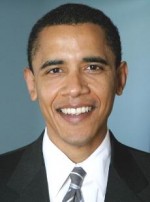Who’s Next? CSC Campus says Obama

With the upcoming primaries and the election just nine months away, Castleton students and professors have started picking favorite candidates to fill their beliefs of what the new president should be.”I am looking for someone who can undo as much of the damage as the (George) Bush administration has inflicted on us as possible,” English professor John Gillen said, stating the leading Democratic parties, Hillary Clinton and Barack Obama, as candidates he could “definitely live with.”
The anti-Bush sentiment extended to some students as well. Stacia Buckwell, unable to vote against Bush in the last election, said she feels it is “important to get a strong leader for the country.”
Though strong in his opinions of the candidates, Gillen is interested in one thing.
“What matters in this game is results,” he said, referring to undoing Bush’s “damage.”
But even with the almost nonstop election coverage, students are still confused about who’s running for what. Sarah Arnold, psychology major, attributes the media to her lack of knowledge of the issues the candidates are working for.
“I think I know more personal things than their political stances,” Arnold said.
Stacia Bucknell agrees that the coverage is “misconstrued.”
“It’s hard to tell what’s going on from the media,” she stated.
Business professor Paul Albro echoed these sentiments, saying he was disappointed in the change that happened to politics in media since he went to school in the late 60s.
“It’s become much more divisive and much less issue oriented,” Albro said.
One method of voting that some students like Arnold and Joe Marcum will be using when they visit the polls is the process of elimination.
“If I don’t vote for someone, I’ll vote against everyone else,” Marcum said.
With the media focusing on the race for the Democratic candidacy, the Republicans have been left in the background. But even the Republicans aren’t excited about their choices of candidates.
“It’s a bum year for conservatives,” Marcum said. “There’s really no conservative candidate. McCain is very liberal.”
Karee Chad went even so far to say that she didn’t like any of the candidates, calling the Republican candidates “old fogies” and stating that the country isn’t ready for a black or woman president.
“Clinton didn’t have a good rap as the First Lady and Obama is too progressive. I don’t think a lot of the middle states are ready for that,” she said.
Bill Allen, Castleton’s Dean of Administration who used to work for the White House distributing Executive Office Publications such as press releases, believes a change in race or gender may help the country.
“I think it can only help to have people with many different backgrounds involved in the process and be taken seriously as candidates for the presidency,” he said. “I do think it will help move the country forward in positive ways.”
So who will they be voting for?
“I’m not convinced Obama would be an effective leader or as successful in undoing the damage as Clinton,” Gillen said.
“I’m leaning toward a Republican candidate, however, I’m not sure there is a Republican candidate that is really in tune with my beliefs,” said George McGurl, director of development in the Alumni Office.
Stacia Bucknell was more adamant about her choice.
“Hillary. First of all I’d like to see a woman president and she’s a strong candidate and would be a strong leader for the country right now,” she said.
“I’m going for Obama. For some reason I am drawn to him and like him,” Sarah Arnold said.
“I have not made a decision yet on candidates other then I would not vote for Hillary Clinton for dog catcher let alone President,” Bill Allen said.
Sarah Arnold wasn’t able to get to the polls last presidential election between school and work, though she hopes to make it to the polls this time.
With the dismal choices for candidates, Kerry Chad doesn’t think she will be in line at the poll come voting day.
“I feel it’s useless and we don’t have much of a chance when the red states vote for the most publicized candidate,” she said.
Professors John Gillen and George McCurl feel just the opposite.
“It’s important for the future of this country that they come out and vote,” Gillen said.




